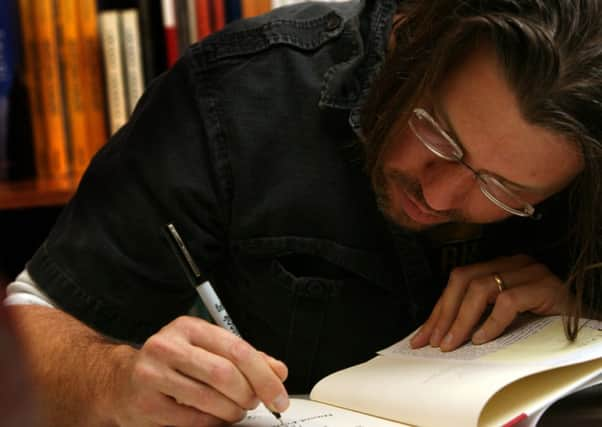Book review: The David Foster Wallace Reader


Even though I have a slight problem with readers in general, this anthology was like meeting some very old friends. If it takes away anyone’s intimidation at Foster Wallace’s epic oeuvre, it will have succeeded in its project; and I genuinely hope that it does.
Almost everything in the book has been published beforehand (with two exceptions, more on which anon) – there are excerpts from his two completed novels, The Broom Of The System and the epoch-defining Infinite Jest and the novel left incomplete at his death, The Pale King; the short story collections, Girl With The Curious Hair, Brief Interviews With Hideous Men and Oblivion and non-fiction pieces and essays from the books A Supposedly Fun Thing I’ll Never Do Again, Consider The Lobster and the posthumous Both Flesh And Not. Since his death, there has been a trickle of Wallaciana: his philosophy thesis, Fate, Time And Language: An Essay On Free Will (not collected here) was published, his work Signifying Rappers: Rap And Race In The Urban Present was reissued; his Kenyon College Commencement Address – a kind of personal manifesto – was released as This is Water. It would have been difficult to find appropriate excerpts, but there is nothing here from his mathematical work, Everything And More: A Compact History Of Infinity.
Advertisement
Hide AdThe unpublished material in the Reader is both odd and elegiac. One section of 15 pages is entitled “Teaching Materials” and is basically the handouts he gave at the start of creative writing classes. Although one can glean a sense of Wallace’s taste from these, and it shows, albeit, covertly, his concern for decency (especially in the notes about providing feedback) these are pretty thin pickings. There are a few email exchanges with his mother, which are touching, and makes one hope that a Collected Letters (could it even be called that? “Selected Missives And Mails” maybe?) might in due course be published.
The first thing in the book is a hitherto uncollected short story – indeed, the first proper short story Wallace wrote and which was first published in the Amherst Review in 1984. Entitled “The Planet Trillaphon As It Stands In Relation To The Bad Thing” it is truly astonishing. Written in the first person, the narrator has had a psychotic incident and is taking anti-depressants; he likens being on Tofranil as being on the alien planet of Trillaphon as he dubs it, whose gravity must be stronger because you get tired more easily and it is “tilted on its axis or something” because the ground seems to list. It is a genius concept, and so much of Wallace’s later work can be seen in embryo here. There is the aw-shucks bathos, the catchy use of “like” and “something” and “pretty much” and “what the heck” and “troubled little soldier” coupled to polysyllabic pyrotechnics and a horrific, excoriating self-consciousness. There are unusual names – and an awful pun (a girl whom he likes is called May, and her parents, we learn, are Mr and Mrs Aculpa). There is the self-cancelling rhetoric: the narrator constantly says he “won’t go into that much”, then duly does; creating an emotional tangle of embarrassed reticence and unstoppable confession. Its depiction of depression has awful clarity and almost physical pain. “All this business about people committing suicide when they’re ‘severely depressed’; we say ‘Holy cow, we must do something to stop them killing themselves!’ That’s wrong. Because all these people have, you see, by this time already killed themselves, where it really counts. By the time these people swallow entire medicine cabinets or take naps in the garage or whatever, they’ve already been killing themselves for ever so long. When they ‘commit suicide’, they’re just being orderly. They’re just giving external form to an event the substance of which already exists and has existed in them over time”. Wallace, of course, committed suicide in 2008.The story is a terrible tocsin, tolling out an equally terrible sense of inevitability.
In terms of the selection of other pieces: well, they’re wonderful. I have personal favourites that didn’t make the cut – the essay “Big Red Son” where Foster Wallace attends the “porn Oscars”, originally called “Neither Adult Nor Entertaining”; the stories “Luckily The Account Representative Knew CPR” and the accomplished simultaneous story “Here And There”. It is perhaps a little coy on politics: although we have his 9/11 piece, “The View From Mrs Thompson’s”, it would have shown his breadth to include perhaps “Up, Simba!”, his account of travelling on the McCain campaign trail in 2000, or even the very short “Just Asking”. Nevertheless the editors have done sterling work in compiling the reader. My problem with readers is their very nature: why read excerpts from Infinite Jest when you could read, well, Infinite Jest?
Some pieces have an afterword by writers like Anne Fadiman and Hari Kunzru. These contain surprising enlightenments. “Incarnations Of Burned Children” is a masterpiece short story, its unspooling, lengthening sentences cut down with the aching line “If you’ve never wept and want to, have a child” (a perfect iambic pentameter, by the way). But Nick Maniatis reveals that it was intended to be the back story for one of damaged characters in The Pale King.
Foster Wallace was one of the most ingenious and engaging writers of our era. If only this book hadn’t have to have been published.